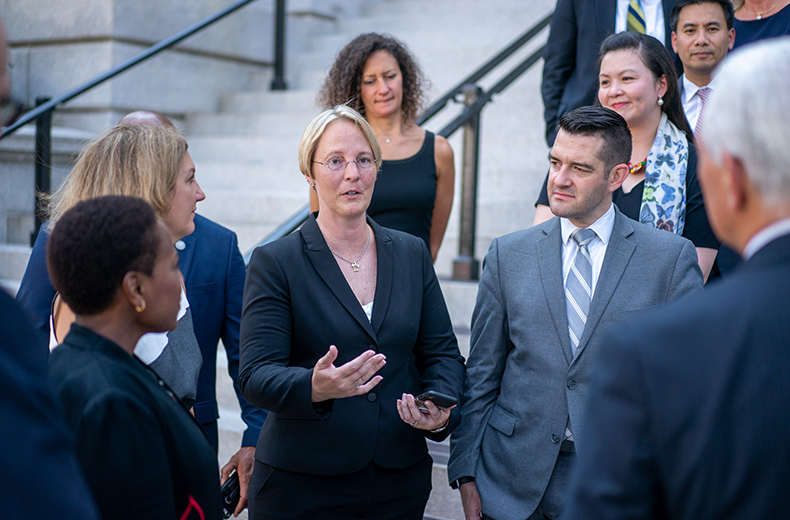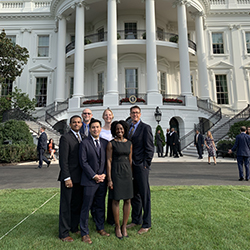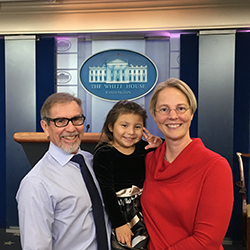
Physician Spends Year as White House Fellow in Effort to Improve Customer Experience for Millions of Americans

As a White House Leadership Fellow, Michelle Dorsey, MD, spent the last year advancing the standing of the Veterans Administration.
Dr. Dorsey, chief of radiology at the Phoenix VA Health Care System and a clinical assistant professor in the Department of Radiology at the University of Arizona College of Medicine – Phoenix, was the first physician to represent the Department of Veterans Affairs as a White House Fellow. Her appointment was from October 2018 to September 2019.

Dr. Dorsey worked in the White House Office of Management and Budget, providing programmatic leadership of the federal government’s Customer Experience Cross-Agency Priority Goal. Improvements to customer service have the potential to impact millions of Americans in such areas as veterans’ health care, Medicare, federal student aid, airport security screening, national parks, passport services, and emergency and disaster relief.
“I worked to advance the aim of providing a modern, streamlined and responsive customer experience across the federal government,” Dr. Dorsey said. “I spent a lot of time establishing relationships with representatives at the 25 High Impact Service Providers (HISP) and facilitated their fulfillment of the customer experience requirements set forth in Office of Management and Budget Circular A-11 Guidance. I hope the progress we made will enhance the ability of the federal government to deliver customer-centered services and improve millions of citizens’ experiences.”
Last year, Dr. Dorsey said they accomplished many “firsts.” They facilitated completion of the first HISP Self-Assessments, which established a baseline of customer experience maturity across government. They also helped HISPs complete the first publicly released action plans, outlining future directions for customer service growth in such areas as measurement, governance, organization and culture, customer research and service design. HISP customer feedback was published on Performance.gov dashboards for the first time in September 2019, which was the culmination of efforts dating back to the Clinton Administration. Finally, Dr. Dorsey was honored with a Service to the Citizen Award as part of the CAP Goal Customer Experience Interagency Team, which recognizes public servants who demonstrate excellence in their delivery of services that impact the public’s lives.
“One of the biggest lessons for me was that the capacity of our federal government is truly vast and awe-inspiring,” Dr. Dorsey said. “Coming from the field, we are frequently insulated from the work of other agencies. It was incredible to have the chance to meet such enthusiastic, dedicated people working across government, many toward common goals. There were offices, programs and initiatives underway, many of which were new to me, aimed at improving the lives of countless Americans.”

Dr. Dorsey said she is fortunate to have had the support of senior leadership, including the Executive in Charge of the Veterans Health Administration, Richard Stone, MD, in working on larger initiatives within the VA. She has a part-time role in the Office of Patient Centered Care and Cultural Transformation, working to more broadly address the social determinants of veterans’ health.
Dr. Dorsey has already reached out to many of her contacts from last year to advance initiatives that benefit veterans. For example, she recently facilitated a connection between the VA’s National Center on Homelessness among veterans and the U.S. Interagency Council on Homelessness.
“I hope to continue to leverage my experience in the White House to improve the care we provide for our veterans,” Dr. Dorsey said.
Topics
About the College
Founded in 2007, the University of Arizona College of Medicine – Phoenix inspires and trains exemplary physicians, scientists and leaders to advance its core missions in education, research, clinical care and service to communities across Arizona. The college’s strength lies in our collaborations and partnerships with clinical affiliates, community organizations and industry sponsors. With our primary affiliate, Banner Health, we are recognized as the premier academic medical center in Phoenix. As an anchor institution of the Phoenix Bioscience Core, the college is home to signature research programs in neurosciences, cardiopulmonary diseases, immunology, informatics and metabolism. These focus areas uniquely position us to drive biomedical research and bolster economic development in the region.
As an urban institution with strong roots in rural and tribal health, the college has graduated more than 1,000 physicians and matriculates 130 students each year. Greater than 60% of matriculating students are from Arizona and many continue training at our GME sponsored residency programs, ultimately pursuing local academic and community-based opportunities. While our traditional four-year program continues to thrive, we will launch our recently approved accelerated three-year medical student curriculum with exclusive focus on primary care. This program is designed to further enhance workforce retention needs across Arizona.
The college has embarked on our strategic plan for 2025 to 2030. Learn more.